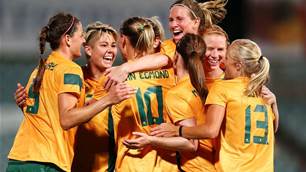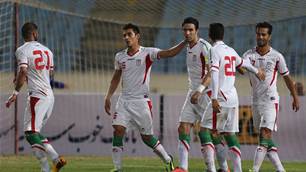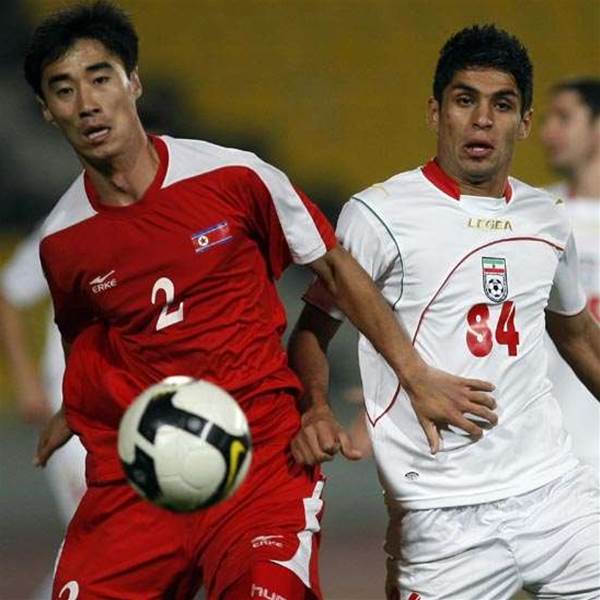D is for 'Death'. A very competitive group features Asian Cup holders Iraq, perennial up-and-downers Iran, World Cup 2010 finalists DPR Korea and strong qualifiers United Arab Emirates. With a number of unpredictable teams, Group D leaves pundits scratching their heads.
Iraq
If you put a bet on Iraq winning the AFC Asian Cup four years ago, you were either a genius or a deranged fool.
As it turned out, the Iraqis made us all look stupid with world sport's feel-good story of 2007. Iraq played fabulous, passionate football willed on by supporters back home desperate for something to cheer in their troubled homeland.
Making a mockery of bizarre preparations and thriving on the adversity, Iraq's footballers galvanised, outclassed Graham Arnold's Socceroos in the group stage and stunned the continent by qualifying for, then winning, the final against tournament favourites Saudi Arabia.
Fast forward to 2010 and the good news is most of 2007's golden generation is back again. Gifted striker and skipper Younis Mahmoud is the focal point up front. Fortuitously, the 27-year-old plies his trade in Qatar with Al Gharafa, so he'll feel right at home.
But there are others who can cause damage for a side currently ranked 94 in the world and eighth in the AFC. Emad Mohamed, 28, from Egyptian powerhouse Zamalek, is a proven goal-scorer at international level - his two goals against Qatar in October a reminder of his danger.
However, this time, it's a different mindset. Four years ago, Iraq played without pressure - just joy for their perilously divided nation. Now, as reigning champions, nothing less than a repeat will be expected in Qatar. And that task is made even tougher in group D (which is D for death, surely?) that features Iran and DPR Korea.
As reigning champions, Iraq were spared qualifying for Qatar 2011 (2007 runners-up Saudi Arabia and third-place finishers Korea Republic also received direct entry). As such, it's a little tougher to judge their form - if indeed that is a much of a guideline given four years ago they went into the Asian Cup with a coach barely a month into the job, unable to train in their homeland and forced to play 'home' games outside Iraq.
Nevertheless, Iraq has been busy in the lead up. The 'Lions of Mesopotamia' qualified for the semi-finals of October's West Asian Football Federation (WAFF) Championships only to lose to Iran. And across the region there have been hit-outs with Jordan, Qatar, Oman, India, and Kuwait. Add to that November's Gulf Cup of Nations and with a couple of games against Syria in December and the Iraqi engine should be purring come Qatar, ready for another upset.
The conditions in Qatar will suit and some will argue Iraq are now nearer their physical peak than in 2007. But it's tough going back-to-back at any major tournament.
Star Man
Playmaker and 2009 Asian Footballer of the Year Nashat Akram is the jewel of the side. He played for Qatari club Al Gharafa in 2009, though after a spell in Holland in 2010 was club-less at time of writing. Akram, 26, will be the creator and if allowed can destroy teams.
The Coach
Wolfgang Sidka - Iraq has struggled to emulate their success since the famous 1-0 win over Saudi Arabia in the 2007 Asian Cup Final. Part of this could be due to the six coaching changes that have taken place over the three years since Jordan Viera won the Asian Cup. Sidka, a vastly experienced coach from several positions since he started in 1988, has admitted he has a tough task ahead of him but remains optimistic: "My mission with the Iraqi team will not be easy, but I will be sure to put together a strong side."
FourFourTwo predicts...
Tough to win it again but national fervour back home can do wonders for the Iraqis.
Iran
The roller-coaster that is Iranian football continues. A disappointing FIFA World Cup 2010 qualification campaign saw 'Team Melli' finish second bottom of their group and bedevilled by coaching upheavals after the short but tumultuous reign of former playing great Ali Daei.
Stability was restored under new coach Afshin Ghotbi as they comfortably negotiated AFC Asian Cup 2011 qualifiers. Iran, the three-time continental champions topped a relatively easy group ahead of Jordan, Thailand and Singapore, conceding just twice in six games, while scoring 11 times and losing once, away to the Jordanians.
Once again, the full weight of expectation from football-mad Iran will be on the national team after an Asian record 12th qualification for the event - a feat they share with South Korea. But Iran's inconsistency is a worry.
At October's West Asian Football Federation Championships in Jordan, a surprise 2-1 loss in the final to the young Kuwaitis brought them back to earth. With recent wins over China and Korea Republic in lead-up friendlies and, predictably, a loss to Brazil in neutral UAE, their up-and-down form continues. Unstable internal football culture aside, there is no denying they produce high quality footballers. Javad Nekounam will be a threat from midfield and skippers the side in the post-Karim Bagheri era. His Osasuna teammate Masoud Shojaei is another to keep an eye on, while one-time Bolton player Andranik Teymourian showed briefly what he can do in the Barclays Premier League.
As for the home-based players, Gholamreza Rezaei and Pejman Nouri from the Iranian Premier League (Saba Battery and Malavan respectively) are also worth keeping tabs on. If Ghotbi's men can muscle their way out of this Group of Death no-one will want to play them as the tournament heads towards its climax. With this in mind, the coach is looking at a certain European mentality to go beyond their third place finish four year ago.
"We should build a team which gradually becomes stronger in each match. Like Germany," he suggests. Perhaps this isn't a bad idea given a number of Iranians have played in the Bundesliga, though that number has dwindled in recent years. And that's what troubling. In recent years, foreign based players were much greater in number than the current squad.
That said, Iran spectacularly derailed Australia's 1998 FIFA World Cup hopes on that night at the MCG in 1997. So whatever you do, don't under-estimate the unpredictable Persians and their fighting spirit - even if on paper this squad doesn't appear as strong as previous incarnations.
Star Man
A defensive midfielder renowned for his distribution and long-range efforts, Javad Nekounan is one half of the Iranian duo currently plying their trade in La Liga with Osasuna. He has well over 100 caps for Iran and at just 30, could very well break Ali Daei's record of 149.
The Coach
Afshin Ghotbi - Ghotbi is one of the few domestic born coaches in the Asian Cup. Despite being raised in Iran, Ghotbi has had a relatively international career; his resume spans the United States and South Korea but most of his success has come in Iran, winning with Iranian domestic league, known as the Gulf Pro Cup, with Persepolis in 2008. He left the club, citing "a conspiracy outside of the club to prevent the team's success" as his reason, signing for the national team in 2009.
FourFourTwo predicts...
Tough to beat but winning the trophy won't be easy with South Korea, Japan and Australia also over in Qatar.
Continues on next page...
U.A.E.
It's a hot-seat that's seen the likes of Roy Hodgson, Dick Advocaat, Carlos Queiroz and Mario Zagallo take charge of this wealthy Gulf nation.
These days, Slovenian Srecko Katenec has the job and aside from being drawn in a 'Group of Death', he's got some other concerns leading into Qatar.
The UAE pulled in just 200 fans for a friendly in Abu Dhabi last October. A similarly sparse figure turned up for a hit-out against Chile that same month. Rightly or wrongly Katenec, 47, publicly criticised his
nation's fans for their apathy towards the nation team.
This says much about where the UAE is as a football nation. They may enjoy increasing influence in world football with ownership of clubs like Manchester City and hosting tournaments such as the Club World Cup, but UAE football still fails to fire the imagination of Emirati fans when it comes to a deep interest in the sport and their own national team.
Based on AFC 2011 Asian Cup qualifiers, UAE probably deserved more interest after their eighth qualification for the tournament. Katenec guided his boys to top spot in Group C ahead of Uzbekistan and Malaysia (India, originally in this group, were awarded automatic qualification after winning the 2008 AFC Challenge Cup).
UAE's 1-0 win in Tashkent courtesy of a late goal from from Al Jazira midfielder Sultan Al Menhali was after qualification had been sealed and after they'd been beaten 1-0 at home by the Uzbeks. However UAE shredded the hapless Malaysians 5-0 with Ismael Matar and Mohamed Al Shaddadi bagging a brace each and talented Ahmed Khalil rounding out the romp in Kuala Lumpur.
The national team won't be short of useful lead-in games ahead of January either, with both the 2010 Gulf Cup in Yemen and the Asian Games to prepare them.
It won't be easy for for the 2007 Gulf Cup champions currently ranked 99 in the world and 12 in the AFC when they touch down in Qatar. In a devil of a group, reigning AFC Asian Cup champions Iraq, FIFA 2010 World Cup finalists DPR Korea and Iran join them.
UAE's pampered footballers will need to show some grit to get out of this group. A lack of really 'wanting it' is an accusation regularly aimed at nations like the UAE whose players can earn fat contracts to stay in the Emirates (Katenec's entire squad is domestic based).
However, if they do spring a surprise and scrape through the group, it surely will rev-up the Emirati supporters back home.
Star Man
Twenty seven-year-old Ismael Matar will be the key to his team. He's closing in on 100 caps for his nation and averages almost a goal in every three. Sydney FC striker Alex Brosque remembers Matar from the 2003 Youth World Cup in the UAE. "He was very small but had a great touch; they played through him all the time."
The Coach
Srecko Katanec - One of the rare people in football who can claim to have earned full-international caps for two nations, former Yugoslav international Katanec also appeared for Slovenia. His coaching career has been a mixed bag of results, leading his native Slovenia to relative success in qualification for the 2002 World Cup, but he has experienced fallouts with star players when managing both Slovenia and Macedonia. If he recreates his success in Slovenia, the UAE could be a force come this tournament.
FourFourTwo predicts...
The UAE will have done extremely well to qualify from this group.
DPR Korea
Despite reaching the World Cup finals for only the second time after a wait of over forty years, DPR Korea, or North Korea, sit at a lowly ranked 106 in world football.
In a Communist nation where there have been cases of under-performing athletes being sent to prison camps, the DPR Korea team were deemed to have got-off lightly after South Africa, where their entire squad was forced onto a stage and subjected to criticism from the sports minister, while 400 government officials, students and journalists watched.
They will not want to succumb to the same embarrassment again after three losses at the World Cup, including a 7-0 drubbing by Portugal, the first and likely last time a live football game will be shown in the country.
On the Asian scene, the team have progressed in recent years and won the 2010 AFC Challenge Cup in February this year in Sri Lanka, although their opposition, including Turkmenistan, Tajikistan and Myanmar, did not provide the steeliest of challenges.
Preparation for the Asian Cup has been virtually non-existent, as after the final group game in the 2010 World Cup - a 3-0 loss to the Ivory Coast in South Africa - the team didn't play another competitive game until early November when they squeezed past Singapore 2-1.
Politics, the nation's dictatorship status and the government's involvement in the national team are the squad's biggest enemy. As for the actual team, a lack of firepower, depth and little chance to play teams from outside Asia has left most of the players internationally inexperienced.
On the upside, bar their leakage of 12 goals in South Africa, DPR Korea's modern success stems from a solid backline. A five-man defence and supporting midfielders conceded just seven times in 16 World Cup qualifiers. This ultra-defensive approach has at times proved successful and the swift counter-attacks are capable of catching out an opposition that strays too far forward. Unpredictability and mental strength will be key to progression.
The predominantly domestic-based squad will be heavily banking upon their captain and forward Hong Yong-Jo. Hard-hitting defender Pak Nam Chol has the task of keeping the back-line disciplined and reducing attacks upon impressive keeper Ri Myong-Guk, with veteran playmaker Mun In-Guk orchestrating play.
Star Man
Japanese-born Jong Tae-Se is the undisputed King of North Korean football. Described as the "The People's Rooney" he endeared himself further to his compatriots when he cried as the national anthem was played in South Africa 2010. Fast, powerful and direct, 15 goals in 25 games for his country ensured a summer transfer to Germany's VFL Bochum.
The Coach
Kim Jong-Hun - Few would not sympathise with Kim Jong-Hun, bar the country's Government. After the recent World Cup, team members were reportedly individually told to criticise the coach and he was forced to perform hard labour on a construction site. This after leading them to their first World Cup in over 40 years. Failure in Qatar is not an option, but don't be fooled by his brooding demeanour, this no-nonsense coach received more red cards than his players.
FourFourTwo predicts...
With little proper preparation and limited support from their country, just escaping from Group D is very unlikely indeed.
Related Articles

Asian Cup - one year to go

Matildas draw world champs Japan in Asian Cup













